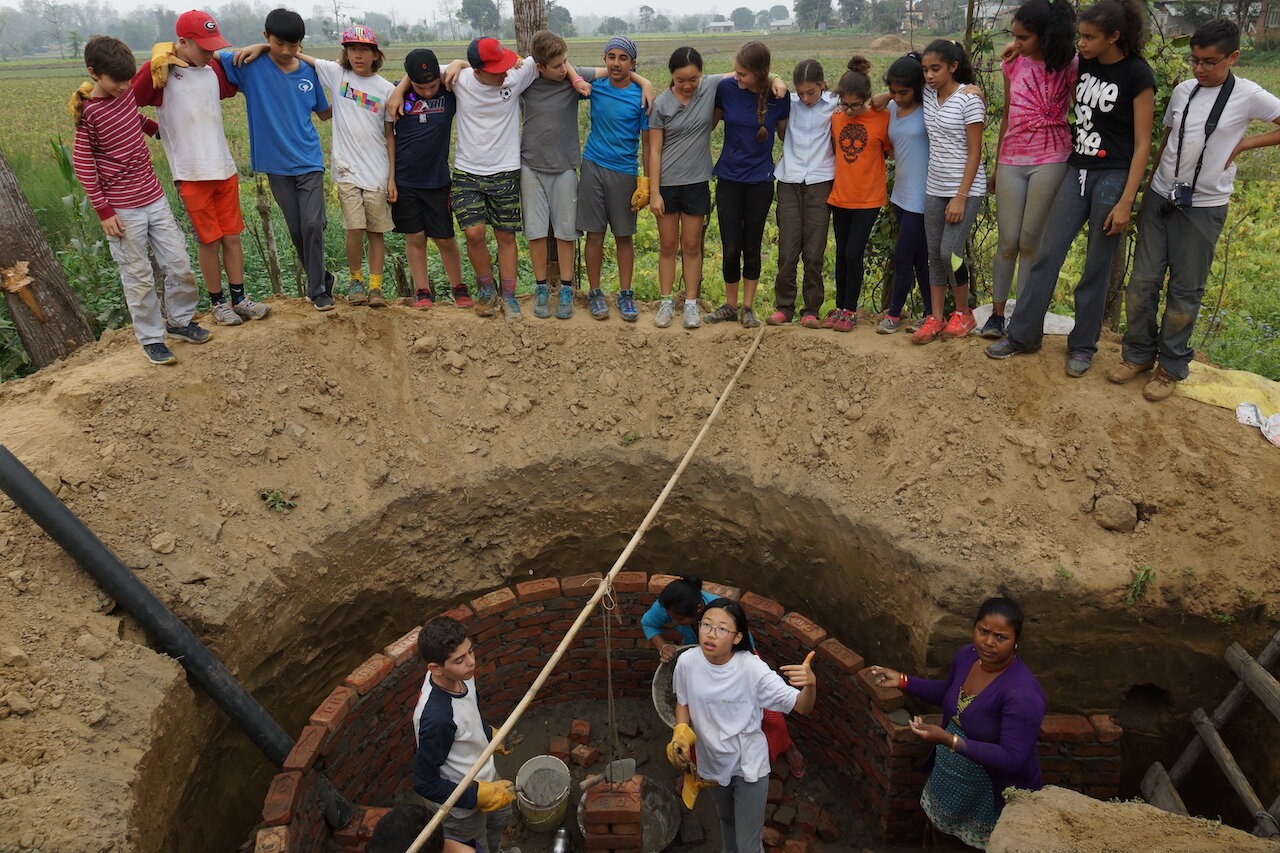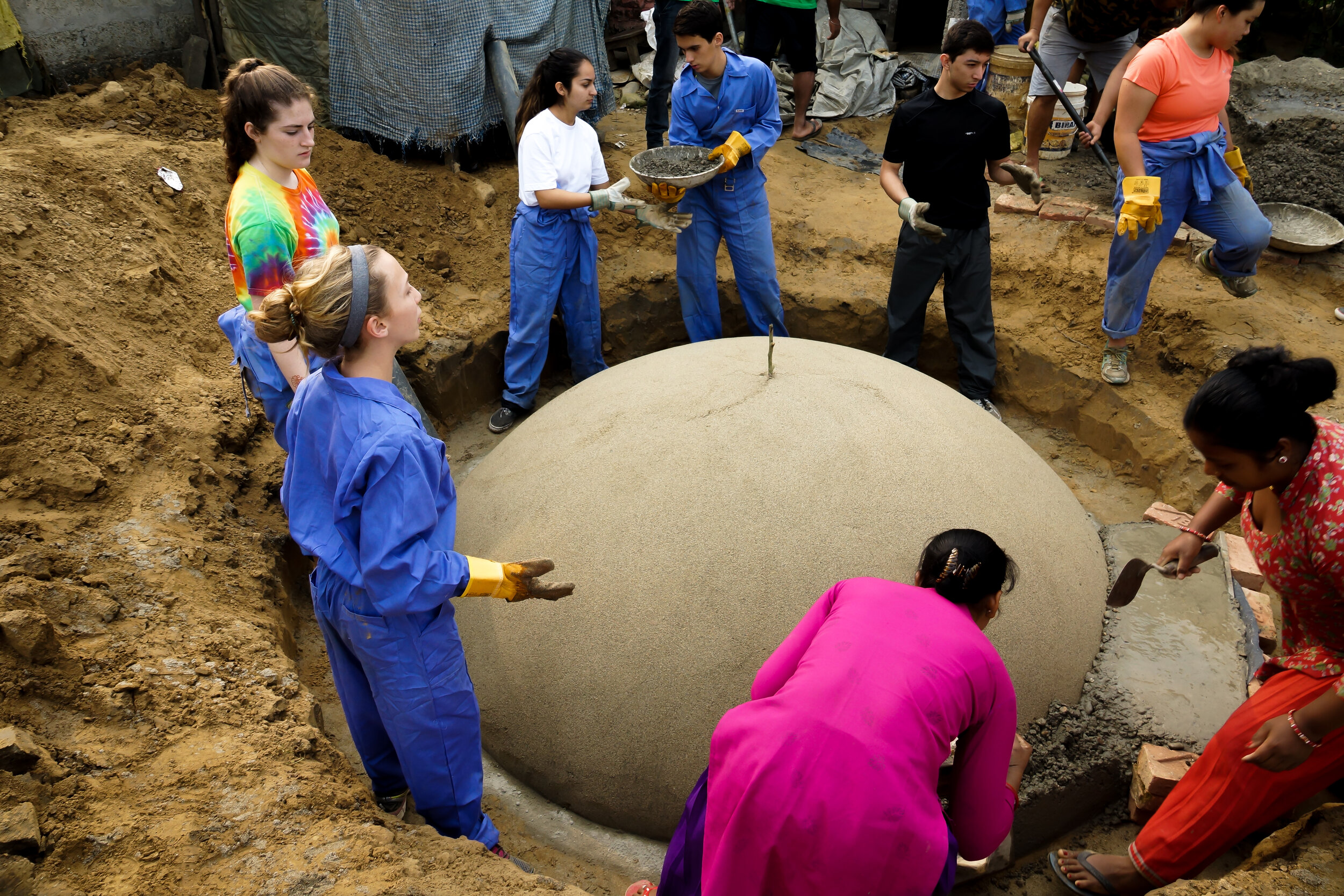
BIOGAS & NATURE CONSERVATION PROJECT
Global Goals Covered
Highlights
Build sustainable biogas chambers
Learn how to cook traditional Nepali food
Go white water rafting down pristine Himalayan rivers
See Rhinos, Elephants and hopefully Tigers on a jungle safari
Sleep under the stars in our own campsite, enjoying s’mores around the fire
This 7-day journey takes you to a part of Nepal where Rhinos, Tigers & other endangered animals are starting to thrive due to various wildlife protection schemes. On this trip we will experience first hand the stunning nature of Nepal, including going white water rafting as well as a jungle safari to spot some of these amazing creatures. The service focus of our time will be helping build bio gas, which helps to ensure Nepal’s natural environment is maintained for future generations of animals and humans alike.
Students will be playing a vital role in helping to build the bio digesting chambers for 2 plants while they are in Nepal. The legacy you leave behind will be a completely sustainable energy source for Nepali families that will last for up to 40 years, protecting them and endangered animals from danger, as well as health issues.
An Overview
This is a high-impact service trip that involves building a bio gas chamber for local villagers, which helps protect the natural environment as well as improving the health of local people through clean energy production. The work done here will protect wild elephants. rhinos and tigers, saving 4.5 tons of firewood per family per year and ensuring that families stay healthy, for up to 40 years.
Biogas is methane gas produced by animal or plant waste. The waste material is collected, placed into a bio digesting chamber and fermented until methane gas is produced and stored in the same chamber. When gas is required by families for cooking, lighting and heating, a tap is opened and methane is fed to a stove which can then be used for daily chores.
Students will be playing a vital role in helping to build the bio digesting chambers for 2 plants while they are in Nepal. They will dig the foundations of the chamber in the garden of one recipient family, cement a round wall and cast the chamber’s dome for a second bio gas plant in a different location.
Students will kick off their adventure by white water rafting on the Trisuli River and we’ll visit Chitwan National Park, where we have the chance to see wild rhino, tigers and even elephants. And lastly visit a selection of World Heritage sites in Kathmandu before flying home to their families.

Pre Trip Activities
In order for the participating students to get as much experience, knowledge and enjoyment from the trip to Nepal as possible, Mountain Quests will prepare the students before the departure in a seminar. The preparatory seminar sessions can be arranged at the school or online. The seminar usually includes topics on cultural sensitivity, specific development challenges facing Nepal and an in-depth explanation of the development output of biogas.
All students will receive pre-departure information containing YouTube videos, articles and other material in order to gain further insight of the project and the destination. If needed, an information meeting for parents can also be arranged as well.
This Trip Is Best For
Students who are:
Looking for a high impact service project to protect endangered wildlife as well as humans
Wanting to go on a jungle safari, go white water rafting and camp on the banks of a river
Excited to interact with your host community through various activities and games

The Itinerary
Today we’ll fly to Kathmandu. A Mountain Quests’ employee will depart with you. Upon arrival in Nepal we’ll check in to our hotel and grab dinner. Today is predominantly a travel day, but after dinner we will give the students an introduction to Nepal and the bio gas project.
After an early breakfast we’ll take a private coach to Chitwan, stopping on the way for white-water rafting. It will take about 3 hours to reach the start of the rafting, and we’ll be snaking through canyons and deep into fertile farming valleys along the way. When we reach the rafting start-point, we’ll have an early lunch, prepared from the organic gardens on the banks of the Trisuli River, which is what we will raft on. After a thorough safety briefing we’ll hit the rapids, working in teams to navigate our way down the river. After about three hours of rafting we’ll get back onto the coach for another 2 hours before arriving in Chitwan, where we will be spending the next 4 days. We’ll unpack our luggage, assign our tents and generally settle in. We’ll finish the day with a traditional Nepali Dal Bhat dinner before turning in for the night.
We’ll be woken up early with some traditional Nepalese tea before breakfast. After fueling up we’ll cycle to the Biogas station to begin our project. The first day of the project will normally begin with excavation of the land where the biogas plant will be, followed by floor soiling and round walling (don’t worry, this will all be explained). In the mid afternoon, after working at the plant, as well as lunch half way through, we will head back to the village and refresh ourselves with some cold drinks!
The day will end with dinner, but not before you have learned to cook it. We’ll learn how to cook the famous Dal Bhat, the meal that sustains 90% of the population every day. After dinner we’ll get a well-earned rest.
The day will start with our now well rehearsed tea and breakfast, followed by our cycle to the biogas station and new efforts, including plastering and attaching inlets and outlets to the plant. In the mid afternoon after lunch we’ll go on a canoe ride, which will give the students an opportunity to see some ofthe local crocodiles who make Chitwan their home. This fun afternoon will soon be over and after dinner we’ll be back to the tents to sleep.
Today we’ll be waking up early but it will be worth it! After breakfast we’ll spend the morning on a Jeep safari, tracking the local wildlife of Chitwan National Park, which includes rhino, tiger, elephant, sloth bear and crocodiles!
Then we’ll head back to the campsite for lunch before we ride to the biogas station to continue our work. Today is exciting, because it’s the last day of our biogas project. Today we’ll get to see our hard work pay off by witnessing the blue flame produced by the gas plant!
Today’s evening activity will appeal to those with rhythm. We will be learning local Tharu dancing with our hosts. Tonight’s dancing may not appeal to the shy at first, but we’ll soon be on our feet testing our newly-learned moves!
After a relaxing breakfast, slightly later than previous days, we’ll be packing up our things ready for the journey back to Kathmandu. The journey back to the capital will take about 7 hours, broken up with lunch at a riverside restaurant or Himalika resort.
We’ll be back in Kathmandu in the evening, with time to freshen up at the hotel before dinner.
After breakfast we’ll leave our hotel and head to 2 of the most iconic Buddhist monuments in the World - Syambunath and Boudhanath. These temples are of huge cultural and religious significance to Buddhists and Hindus and we will spend the morning learning all about them. We’ll have lunch in an awesome restaurant overlooking Boudhanath, before learning all about the significance of the temple.
We’ll grab an early evening meal before it’s time to leave to the airport and head home. It’s been a pleasure to host you in Nepal.

Heath And Safety
Access to quality medical care will vary depending on our location. In Kathmandu hospitals are easily accessible and the ones we use are comparable to international, Western, standards.
In Chitwan, where we are for the project, there is a well-equipped clinic within 10 minutes of our campsite. For more serious injuries, such as broken bones, head injuries etc. There is a large teaching hospital 18km from our site, accessible by paved road. In extreme cases it is possible to call for helicopter evacuation to Kathmandu.
All of our guides are first aid trained, and your head guide is trained in wilderness first aid by the American Red Cross. We have with us at all times a full and well-equipped medical kit. The contents of this can be shared with you prior to departure. We have a support vehicle with us at all times on the trip that will be available to assist in any issue or emergency that requires it.
Students are required to provide us information on dietary requirements, allergies and their health and travel insurance before departure. All allergies and dietary requirements can be taken into consideration and managed.
FAQs
What’s the accommodation like?
During the time in the village you will be camping, 2 students to each tent. A separate, large dining tent is provided, as well as a full camp and cook team. We will be camping on the banks of a river in an excellent location. In Kathmandu we will be staying in a good quality 3 star hotel with full amenities.
What is the weather like?
In Chitwan where we are doing the project, expect daytime temperatures around 25 to 30 degrees, mostly sunny and with rare rain showers. At night temperatures drop to around 10-15 degrees. In Kathmandu it is slightly cooler.
Will I get sick?
Make sure that you always wash your hands with soap before eating any food and do not drink any water that comes from the tap. We will remind you everyday about this to make sure everyone is healthy.
What clothes should I wear?
Light working clothes that cover your knees and shoulders. Prepare to get muddy!
How fit do I need to be?
You don’t have to be a fit person to join this trip.
Health and safety?
All guides are first aid trained and our trip leader is trained in Wilderness First Aid through the American Red Cross. We have many years of experience working with students and have strict safety protocols and risk assessments in place.
How should I prepare?
You will benefit greatly by reading around the science of bio gas before you leave on your trip to Nepal. Equally important is to get a deeper understanding for all the various benefits of bio gas and why this project is such a massive help to the southern plains of Nepal. (Support materials provided). If you haven’t cycled before then pick up a bike and get yourself acquainted. We won’t be cycling on hills or difficult terrain, but the roads in Nepal are often uneven, so some previous experience will go a long way.
Finally, come on the trip prepared to get dirty and tired but t leave with a lot more knowledge of bio gas, the natural world, the complexities of our planet and the lives of Nepali people.
Is the food and water safe?
While camping we have food prepared by our professional cook team, who are trained in clean cooking, as well in how to handle all allergies. In Kathmandu we only go to restaurants we know and trust to serve good quality food.
Inquiries?
If you have questions about this trip, would like to know more or thinking about booking this trip with us, then please contact us at:

